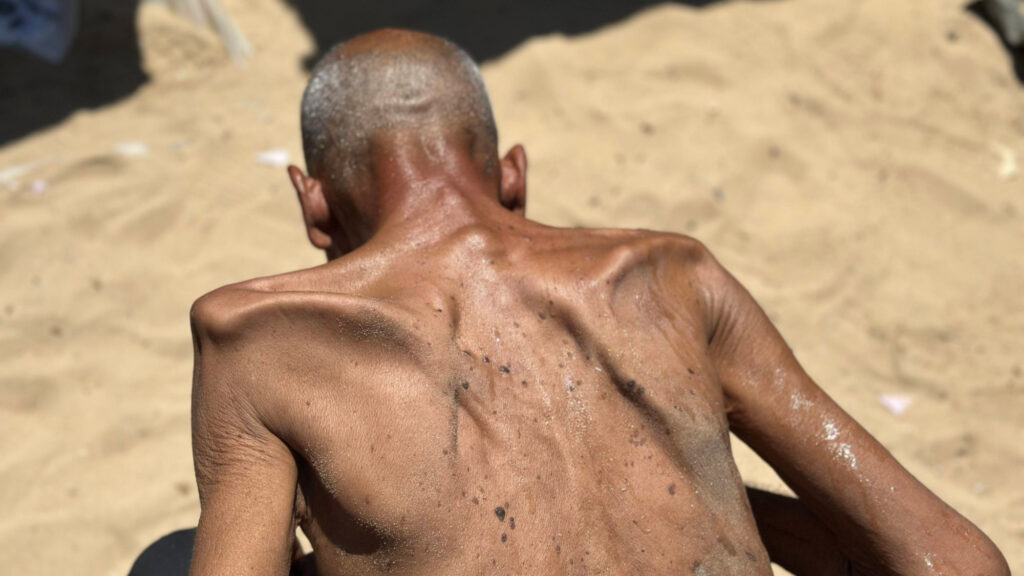Habib Qeshta and his wife Nour were overjoyed recently to learn they were expecting a baby boy.
Already parents to a daughter born before the Israeli genocide in Gaza, the Palestinian couple had hoped a son might bring some light to their dark days under relentless bombardment.
“We were overjoyed to learn it was a boy,” said Qeshta, 27, speaking to Middle East Eye.
But their joy was shortlived.
“A week later, my wife began experiencing unusual pain. She sensed something was wrong, so we went for another check-up,” he recalled.
New MEE newsletter: Jerusalem Dispatch
Sign up to get the latest insights and analysis on
Israel-Palestine, alongside Turkey Unpacked and other MEE newsletters
“That’s when the doctor told us the foetus had died due to malnutrition.”
Nour had carried the pregnancy for four months under heavy Israeli air strikes near their home.
For months, she barely ate any nutritious meals, due to the ongoing Israeli-imposed famine in Gaza.
“All we have are canned beans, duqqa (local spices usually eaten with bread), and thyme. Sometimes we don’t even have bread,” Qeshta said.
“For a pregnant woman, this can’t be considered nutrition.”
Since Israel imposed a total closure of Gaza’s borders on 2 March, nearly two million people in the besieged enclave have entered a new and devastating phase of the war. Wheat flour has become a luxury item, and hundreds have died from hunger and malnutrition.
Although the borders were partially reopened for some goods and international aid, most residents remain unable to access food, either due to soaring prices, looting of aid trucks and the dangers of reaching hazardous aid distribution points.

To be killed by an air strike is easier than watching your children starve
Read More »
With Gaza’s hospitals pushed to the brink of collapse by Israeli bombardments and the ongoing siege, pregnant women are often forced to rely on makeshift medical points for basic check-ups, as hospitals are overwhelmed with the wounded.
“She went to a medical point for tests, and the doctor told her there was no heartbeat – the foetus had died,” Qeshta continued.
“The doctor explained that the baby died from malnutrition. What his mother had been eating lacked adequate nutrition, and the foetus didn’t get what he needed to survive.”
Qeshta’s story is far from isolated.
In the first half of 2025, the Palestinian Ministry of Health recorded at least 2,500 miscarriages and neonatal deaths.
At Nasser Hospital in Khan Younis, in southern Gaza, doctors reported that the number of miscarriages in January and February was double that of the same period in 2023.
Healthcare professionals attribute these miscarriages largely to malnutrition, severe vitamin deficiencies, the collapse of proper medical services, and the constant displacement, bombardment, and fear endured by pregnant women throughout their pregnancies.
‘My body is collapsing’
The Israeli-imposed famine in Gaza has led to 361 deaths from malnutrition, including 139 children, according to the Palestinian Health Ministry.
The most vulnerable have been hardest hit, including pregnant women, children, the sick and the elderly.
Living in a makeshift tent of cloth and nylon west of Khan Younis in southern Gaza, 85-year-old Salim Asfour has already lost some 35 kilograms and now struggles to even stand.
‘I am extremely frail, barely able to stand. ‘
– Salim Asfour, 85, Palestinian
The father of six was displaced from his home in Abassan, east of Khan Younis, and has survived on meagre canned food for the past year.
“My body is collapsing slowly. I never imagined I would spend the last years of my life like this,” he told MEE.
“I used to be active and free of any illnesses. Today, I am extremely frail, barely able to stand. I suffer from severe weakness in my eyesight and constant high blood pressure because of the canned food, which, if we find it, feels like we have found a treasure.”
Even after Israel partially allowed some aid and goods into Gaza, Asfour’s body continued to deteriorate, showing no sign of recovery.
“After they allowed some food in, we could eat rice, bread, and some beans,” he said.
“But my body is still very weak. There are still no eggs, no meat, no chicken, no protein. The goods coming in are too expensive to afford, and the amount is not sufficient.”
Ahead of its planned military offensive to seize Gaza City, the Israeli military announced it will no longer pause attacks to allow aid deliveries in the war-torn city.
The decision follows Israel’s declaration of Gaza City as a “combat zone” and its plans to slow or halt humanitarian aid to the northern parts of the Strip, aiming to force residents to flee southward.

How Gaza’s aid sites have morphed into Israel’s cruellest form of psychological torture
Read More »
But even though residents of Gaza City can still travel south to access aid through notorious US-backed distribution points, Asfour is among many Palestinians unable to reach the limited international assistance Israel permits into Gaza.
“I am an old man. I cannot run among tens of thousands of hungry people under bullets and shelling. I cannot carry anything, nor can I walk several kilometres to reach distribution points,” he added.
“Because of this, there were times when I went five consecutive days without eating bread, surviving only on a little lentil soup thinned with water.”
When the family manages to secure a small amount of food, they reserve it for the children.
“My grandchildren cannot understand why food is so scarce and why supplies are no longer available as before. They won’t understand when we tell them that their portion for the day is only a small piece of bread,” Asfour said.
“Hunger has exhausted us all. I believe that if I do not die from bombing, I will die of starvation or even heartbreak over what has become of us.”

